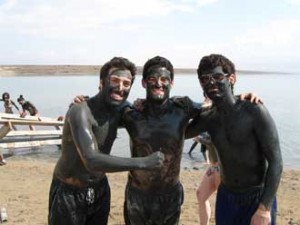
Desautels students’ travel to Israel on business mission
By John Matheson
Some spend reading week lounging on the beach. Others occupy themselves with a backload of schoolwork. Twenty Desautels students, including me, were fortunate enough to travel to Israel during the break to study the country’s national competitiveness. With the recent Israeli elections and conflict in Gaza, it was, without doubt, a stirring time to visit the country. The trip was a distinct success and granted us unique insight into how the relationships among culture, politics, and business combine to determine a country’s competitiveness.
The trip, sponsored by the Schwartz Reisman Foundation, served as the main component of the management course, Perspectives on National Competitiveness, taught by Prof. Karl Moore. Twenty students from Western’s Richard Ivey School of Business joined our McGill Desautels contingent. After spending January and February in class sessions with Prof. Moore, studying emerging ideas on economic regionalism, innovation, and culture, we were equipped with the necessary theoretical foundations to apply to our fieldwork in Israel.
To gain a historical perspective, we spent our first three days in Jerusalem. While there, we toured the Old City and visited sites like the Western Wall. A moment that touched me personally occurred at Yad Vashem, the national holocaust museum. Overcome with emotion, I left early and exited on to an inspirational balcony overlooking the mist-filled valley below. It was then, during the peace and serenity of that instance, I understood the magnitude of history’s effect on Israeli culture.
We also had a private briefing by Bank of Israel Governor, Stanley Fischer. It felt surreal to sit in Mr. Fischer’s boardroom and learn about the country’s economy from the governor himself. During a bus tour of East Jerusalem, we got up-close and personal with the wall which separates Jerusalem from the Palestinian-governed West Bank. Though the trip’s objective was not to study the region’s politics per se, it nevertheless remained an omnipresent theme over our nine-day visit. We would have benefited from a wider range of political viewpoints had our trip been for that purpose, but our group maintained critical perspectives and posed challenging questions to the speakers we heard from.
After Jerusalem, we traveled to the Dead Sea. For me and many of the others, it was pure euphoria – effortlessly floating and painting ourselves with the therapeutic black mud, laughing and enjoying the moment like children. Later that day from a magnificent outlook atop the Golan Heights, we saw the geographical intersection of Syria, Jordan, and Israel with the Sea of Galilee below and Lebanon on the horizon. While there, we visited the biggest exporter and backbone of the Israeli wine industry, the Golan Heights Winery.
In Tel Aviv, we continued to meet business leaders and government officials. A highlight was our meeting with real estate mogul Danna Azrieli. Ms. Azrieli welcomed the group to a truly breathtaking panoramic view of nearly the entire country from the helipad of the Azrieli Center – from Haifa to the outskirts of the Gaza Strip to the urban sprawl outside Jerusalem and the West Bank. The country is not small; it’s tiny. Seeing the country from this perspective prompted Jody Cohen to say, “Now I truly understand how politics, business, and culture are all interconnected and cannot be separated.” We also spent time at the Tel Aviv Stock Exchange and were granted a rare view inside Israeli Aerospace Industries.
Israeli companies are known for their innovative capabilities and technological edge. The “no success like failure” attitude of Israelis is reflective of the constant drive to try out new ideas. Most of our speakers touched on the common theme of “serial entrepreneurialism,” which is instrumental to the country’s competitiveness. Israelis are true innovators as evident from both their prosperous high-tech industries and perpetual improvisation in an area that is comparatively lacking in natural resources.
Reflecting on my experience in Israel evokes a range of emotions and insights. I can, however, conclude one thing with certainty: experiential learning like ours is an invaluable part of my undergraduate studies at the Desautels Faculty of Management, and it allowed my colleagues and me to apply four years of study in practice. Underscoring our learning-by-doing approach was a chance to analyze a real case abou Superpharm (the Israeli version of Pharmaprix) in teams with the Ivey students. Our recommendations were presented to CEO Lior Reitblatt.
Special thanks is given to Zack Belzberg, Sam Langleben, Dan Shiner, Jono Kalles, and Prof. Moore for their diligent efforts. Sharing the learning experience with an impressive group of diverse individuals and the unprecedented access we were afforded are things that make this one of the most memorable and educational experiences I’ll ever have.
John Matheson (B’Com ’09) is graduating from the Desautels Faculty of Management in May. John’s areas of study are Global Strategic Management and Organizational Behaviour. He also has a minor in International Relations. John is originally from New Brunswick and currently has no plans for post-graduation. In the long run, he would like to work in politics and academia.
